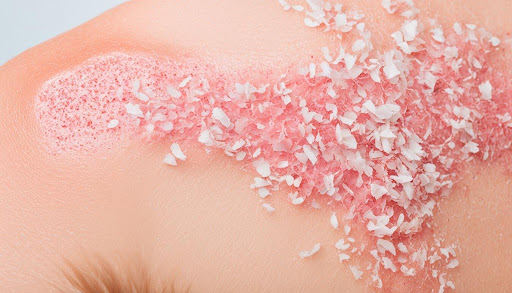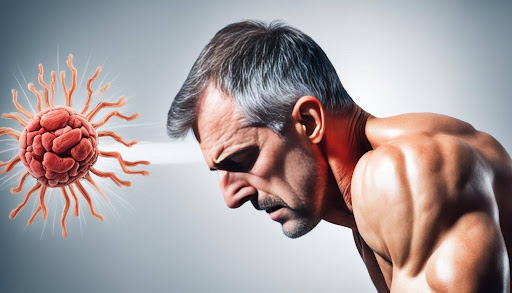Recognizing Protein Deficiency Symptoms Early

Do you think you're getting enough protein? We know protein is crucial for our health. But many of us wonder how to make sure we get the right amount. If we fall short, it's bad news for our health. The truth is, not getting enough protein can cause big problems. So, how can we spot the signs early and avoid these issues? Today, we'll explore how to catch protein deficiency symptoms soon. This knowledge will help us stay healthy.

Key Takeaways:
- Protein deficiency can lead to various health complications if left untreated.
- Recognizing the early signs of protein deficiency is crucial for timely intervention.
- Proper diagnosis and treatment are essential for addressing protein deficiency effectively.
- Prevention and management strategies play a vital role in maintaining adequate protein levels.
- A balanced diet with a variety of protein sources is key to meeting protein needs.
Understanding the Role of Protein in Our Body
Protein is key to our health and well-being. It does many important things in our body, helping it work well and stay healthy.
Essential Functions of Protein
Building and Repairing Tissues: Protein is crucial for fixing and making tissues. It helps muscles, organs, and skin grow and stay strong.
Producing Enzymes and Hormones: It also makes enzymes and hormones. Enzymes help with chemical processes. Hormones control body functions.
Maintaining a Healthy Immune System: Having enough protein is good for fighting off germs. Protein makes antibodies, which stop harmful diseases.
The Impact of Protein on Growth and Development
Protein is super important for kids and teens. It helps their bones and muscles grow. It also helps them mature.
It's crucial for pregnant women too. It’s needed for the baby's organ and tissue development. This keeps both mom and baby healthy.
Protein's Crucial Role in Maintaining Immune Health
Protein is a must for a strong immune system. It boosts how well our body fights sickness.
Our immune system uses proteins to defend against invaders. So, not getting enough protein can make us sick easier.
Protein does more than just fill us up. It's key for our bodies to work right. From growing to staying healthy, protein is a must-have. Remembering this helps us choose better foods. And it helps us avoid being sick.
Early Warning Signs of Protein Deficiency
Not getting enough protein can cause early signs your body warns you about. These signs usually show up in your skin, hair, muscles, and bones. Knowing these signs can help tackle protein deficiency early and avoid more serious issues.
Identifying Changes in Skin and Hair
Protein is key for your skin and hair to stay healthy. If you're low on protein, your skin and hair might change. Look out for dry skin, brittle hair, or losing hair. These are signs that something might not be right with your protein intake.
Noticing early skin and hair changes is important. Addressing these issues quickly can prevent more problems down the road.
Recognizing the Effects on Muscle and Bone Health
Protein is crucial for muscles and bones to stay strong. If you don't get enough, it can hurt them. Signs like feeling weak, tired, or not gaining muscle can point to low protein.
These issues can slow you down and make it hard to move. Catching these signs early can help fix protein deficiency and boost muscle and bone strength.

The table below summarizes the early warning signs of protein deficiency in skin, hair, muscle, and bone health:
| Body System | Early Warning Signs |
Skin | Dry and flaky skin |
| Brittle and dull hair | |
| Thinning hair or hair loss | |
| Delayed wound healing | |
| Inflammation and skin infections | |
| Muscle and Bone | Muscle weakness |
| Fatigue and reduced stamina | |
| Inability to build or maintain muscle mass | |
| Increased risk of fractures and bone loss |
The Consequences of Ignoring Protein Deficiency Symptoms
Not getting enough protein can seriously hurt your health and how you feel. When your body lacks protein for a long time, it can lead to many health problems. These problems can affect you in several ways if you don't address them:
Risks Associated with Prolonged Lack of Protein
- Protein is crucial for growing and developing properly, especially for kids and teens. Without enough protein, they might not grow as they should. This can slow down their development.
- Without protein, your immune system can become weak. Proteins help your body make the cells it needs to fight off sickness. Not having enough protein can make you more likely to get sick.
- Your muscles and bones need protein to stay strong. Not eating enough protein can make your muscles shrink and weak. It also increases the chances of getting broken bones or developing diseases like osteoporosis.
- A lack of protein can lower your body's ability to protect itself. This can make you more at risk for getting sick, like heart disease, diabetes, or certain cancers.
Addressing Protein Deficiency to Prevent Disease
It's key to spot and fix protein issues early to avoid illness. There are several ways to handle protein deficiency:
- Make sure you're eating enough protein: Add a range of protein foods to your meals, like lean meats, fish, dairy, and eggs. Try to hit your daily protein goal depending on your age and how active you are.
- Get advice from a doctor: If you think you might not be getting enough protein, or you're not feeling well, see a doctor. They can check your health, run tests if needed, and give you specific advice to improve your protein intake.
- Think about using protein supplements: Sometimes, you might need protein supplements to get enough protein in your diet. A doctor or a dietitian can help you decide if this is right for you.
- Eat a balanced diet: Aside from getting your protein, it's important to eat a variety of foods for good health. Make sure to include lots of fruits, veggies, whole grains, and healthy fats in your meals.

Groups at Higher Risk for Protein Deficiency Causes
Many factors can increase the chances of protein deficiency. Some people are more at risk. This is because of limited food, certain health issues, and lifestyle habits. Knowing who might be affected helps spot the signs of not enough protein.
Populations Susceptible to Protein Insufficiency
Some groups need to watch their protein intake more than others. These include:
- Elderly individuals: Those who are older might not eat enough protein due to a smaller appetite or chewing issues.
- Athletes and physically active individuals: People who work out often need extra protein to help their muscles heal and grow.
- Vegans and vegetarians: Plant-based diets lack some essential amino acids, so careful planning is necessary to avoid a shortage.
- Pregnant and breastfeeding women: Expectant and new mothers should up their protein to help their baby grow properly.
- Patients with chronic illnesses: Some health problems make it hard for the body to use protein effectively.
These groups should be especially careful about getting enough protein. It may mean changing what they eat or adding supplements to their diet.
How Lifestyle Choices Influence Protein Needs
What you do day to day also affects how much protein you need. This is seen in things like how active you are and if you're aiming to lose weight. For example:
- Physical activity level: If you exercise a lot, you need more protein to help your body recover and get stronger.
- Weight management goals: Protein can be key for those looking to shed pounds. It keeps you full and helps keep muscle mass while you lose fat.
- Dietary preferences: For vegetarians and vegans, finding various plant proteins is crucial to ensure they get everything they need.
- Cultural and religious practices: Some beliefs or customs might limit your usual protein sources, so finding new options is important.
By recognizing these influences, we can better understand our protein needs. This allows us to make smart food choices that cover these needs well.
Protein Deficiency Diagnosis and Treatment Options
Getting the right diagnosis and treatment is critical for protein deficiency. If you have symptoms, see a healthcare provider right away. This can help stop further problems.
Doctors often start with blood tests to check for protein deficiency. These tests look at the level of specific proteins in the blood. They also look at symptoms like changes in skin or hair, weak muscles, and slow wound healing.
After diagnosing protein deficiency, it's time to look at treatment options. Changing your diet is a common first step. It's good to eat more protein. Foods like meats, fish, dairy, beans, and nuts are great.
But sometimes, just changing what you eat isn't enough. That's when doctors might suggest protein supplements. These can be powders, shakes, or bars. They help make sure you're getting enough protein.
Early treatment from healthcare professionals is key to dealing with protein deficiency. It can help avoid serious issues and make you feel better. So, don’t wait to get help if you think you might have a problem with protein.
Strategies for Protein Deficiency Prevention and Management
Prevention and management play a vital role in fighting protein deficiency. The right strategies help ensure you get enough protein. There are some easy tips to keep your protein levels where they should be.
Incorporating a Variety of Protein Sources in the Diet
Eating a mix of protein-rich foods is key to avoid falling short. Combining animal and plant proteins is a good approach. Think about adding lean meats, chicken, fish, eggs, and dairy to your meals. Also, include foods like beans, nuts, seeds, tofu, and tempeh. This way, your body gets all the different amino acids it needs.
Customizing Protein Intake Based on Individual Needs
Everyone’s protein needs are different. They depend on things like age, how much you weigh, how active you are, and your health. It's crucial to adjust what you eat to fit your unique situation.
For instance, if you're an athlete or work out a lot, you might need more protein to help your muscles. Getting advice from a dietitian or doctor is a smart move. They can help figure out the exact protein amount you need.
Conclusion
Knowing the early signs of being low on protein is really important for our health. If we learn about what protein does for us, we can catch when something's wrong. Problems with skin, hair, and even muscle or bones could be signs you need more protein.
Not noticing these signs could cause serious health troubles. You might not grow well, get sick easier, or face more health issues. Taking action fast on low protein is key to staying healthy.
It's crucial to know who's more likely to lack protein, like those with little food or specific diets. To avoid this, vary your protein sources and match your intake with what your body needs.
Always keep an eye on how much protein you're getting, especially if you're showing signs of low protein. Focus on a balanced diet. If you're worried, talk to a health expert to stay healthy.







![[FBVRA1] Vegan Protein Bar (Almond - Cacao, 1 Serving)](/web/image/product.product/1238/image_256)
![[SV24] Soy Protein Powder](/web/image/product.product/1033/image_256)